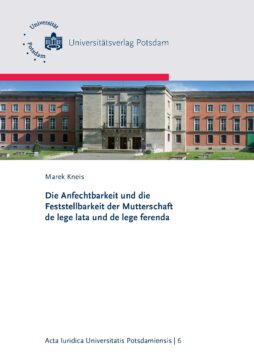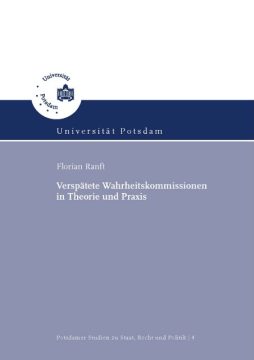This thesis addresses questions related to the conversion of faith during an asylum procedure. It explores how these conversions of faith are treated and assessed by the relevant authorities and courts, whereby the timing, nature and circumstances of the conversion is taken into account.
The thesis begins with an overview of the fundamental human right of freedom of religion and belief and typical risks associated to this. In addition, the legal basis of asylum and refugee protection law is discussed and linked to religion as a reason for flight and persecution.
Next, procedural stages which are affected by a conversion of faith are analysed in-depth. Here national and European case law is taken into account. Of particular importance is the interplay of the state’s duty to inquire and the co-operation requirements of the asylum seeker, whereby special attention is placed on the multi-level governance of fundamental human rights.
The handeling of baptismal certificates and other certificates of religious conviction is another important consideration. Particular emphasis is placed on the constitutional standing of the religious communities and the question of whether the decision of a religious community to accept a new member binds the authority in the asylum procedure. This problem is analysed with reference to current literature and relevant rulings.
The jurisprudential thesis not only offers the reader an introduction to the topic of faith conversion during in the asylum procedure, but also practice oriented support around the most pressing questions of dealing with these conversions during an asylum procedure. Specific recommendations and impulses are presented to develop an equally modern, constitutional and fundamental rights-oriented procedural management.
ISBN: 978-3-86956-509-5
230 pages
Release year 2021
Series: Acta Iuridica Universitatis Potsdamiensis , 7
12,00 €
Non-taxable transaction according to § 1 (1) UStG/VAT Act in combination with § 2 (3) UStG/VAT Act a. F. Providing this service, the University of Potsdam does not constitute a Betrieb gewerblicher Art/Commercial Institution according to § 1 (1) No. 6 or § 4 KStG/Corporate Tax Act. If the legal characterization of our business is changed to a commercial institution subsequently, we reserve the right to invoice VAT additionally. zzgl. Versandkosten
This thesis addresses questions related to the conversion of faith during an asylum procedure. It explores how these conversions of faith are treated and assessed by the relevant authorities and courts, whereby the timing, nature and circumstances of the conversion is taken into account.
The thesis begins with an overview of the fundamental human right of freedom of religion and belief and typical risks associated to this. In addition, the legal basis of asylum and refugee protection law is discussed and linked to religion as a reason for flight and persecution.
Next, procedural stages which are affected by a conversion of faith are analysed in-depth. Here national and European case law is taken into account. Of particular importance is the interplay of the state’s duty to inquire and the co-operation requirements of the asylum seeker, whereby special attention is placed on the multi-level governance of fundamental human rights.
The handeling of baptismal certificates and other certificates of religious conviction is another important consideration. Particular emphasis is placed on the constitutional standing of the religious communities and the question of whether the decision of a religious community to accept a new member binds the authority in the asylum procedure. This problem is analysed with reference to current literature and relevant rulings.
The jurisprudential thesis not only offers the reader an introduction to the topic of faith conversion during in the asylum procedure, but also practice oriented support around the most pressing questions of dealing with these conversions during an asylum procedure. Specific recommendations and impulses are presented to develop an equally modern, constitutional and fundamental rights-oriented procedural management.
Recommended Books
-
 2020
2020Johanna Eilebrecht, Leah Gölz, Eckart Klein, Romy Klimke, Yury Safoklov, Julia Schünzel, Tim Stegemann, Peter Steinbach, Marlene Wagner, Andreas Zimmermann
MenschenRechtsMagazin ; 25 (2020) 2
12,50 €Non-taxable transaction according to § 1 (1) UStG/VAT Act in combination with § 2 (3) UStG/VAT Act a. F. Providing this service, the University of Potsdam does not constitute a Betrieb gewerblicher Art/Commercial Institution according to § 1 (1) No. 6 or § 4 KStG/Corporate Tax Act. If the legal characterization of our business is changed to a commercial institution subsequently, we reserve the right to invoice VAT additionally.
zzgl. Versandkosten
Add to cart -
 2019
2019Die Anfechtbarkeit und die Feststellbarkeit der Mutterschaft de lege lata und de lege ferenda
16,50 €Non-taxable transaction according to § 1 (1) UStG/VAT Act in combination with § 2 (3) UStG/VAT Act a. F. Providing this service, the University of Potsdam does not constitute a Betrieb gewerblicher Art/Commercial Institution according to § 1 (1) No. 6 or § 4 KStG/Corporate Tax Act. If the legal characterization of our business is changed to a commercial institution subsequently, we reserve the right to invoice VAT additionally.
zzgl. Versandkosten
Add to cart -
 2010
2010Verspätete Wahrheitskommissionen in Theorie und Praxis
8,00 €Non-taxable transaction according to § 1 (1) UStG/VAT Act in combination with § 2 (3) UStG/VAT Act a. F. Providing this service, the University of Potsdam does not constitute a Betrieb gewerblicher Art/Commercial Institution according to § 1 (1) No. 6 or § 4 KStG/Corporate Tax Act. If the legal characterization of our business is changed to a commercial institution subsequently, we reserve the right to invoice VAT additionally.
zzgl. Versandkosten
Add to cart -
 2006
2006MenschenRechtsMagazin ; 11 (2006) 2
5,00 €Non-taxable transaction according to § 1 (1) UStG/VAT Act in combination with § 2 (3) UStG/VAT Act a. F. Providing this service, the University of Potsdam does not constitute a Betrieb gewerblicher Art/Commercial Institution according to § 1 (1) No. 6 or § 4 KStG/Corporate Tax Act. If the legal characterization of our business is changed to a commercial institution subsequently, we reserve the right to invoice VAT additionally.
zzgl. Versandkosten
Add to cart
Contact
Potsdam University Library
University Press
Am Neuen Palais 10
14476 Potsdam
Germany
verlag@uni-potsdam.de
0331 977-2094
0331 977-2292





